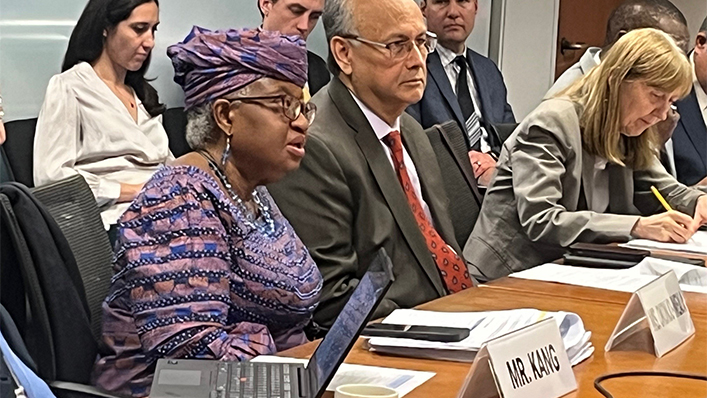
Excellencies,
ladies, and gentlemen,
I am delighted to participate in this meeting in support of the accessions of Ethiopia and Uzbekistan to the WTO. I am also very pleased to be joined by the Chief Negotiators and representatives of Ethiopia and Uzbekistan as well as our development partners. I would in particular like to thank the Vice-President for Europe and Central Asia, Ms Antonella Bassani and the Acting Vice-President for East Africa Mr Amit Dar from the World Bank and the Deputy Director, Strategy and Policy Review Mr Ken Kang, from the IMF for their presence today.
Ethiopia and Uzbekistan have been negotiating their accessions for several years and have made good progress towards their goal to join the WTO by 2026. There are a number of similarities between the two economies. Both are the most populous nations in their respective regions, notably with a significant young population which will be entering the job market. Both have a legacy of strong State presence which they are gradually reducing through market-based economic and legislative reforms. They are also very ably led by excellent negotiating teams which have made it possible to move accession negotiations forward rapidly and I acknowledge with thanks the presence today of their Chief Negotiators.
Completing the long and often complex road to WTO accession requires strong political will, a technically strong and coherent negotiating team led by a competent Chief Negotiator, and support from development partners, both bilateral and multilateral. In the case of Ethiopia and Uzbekistan, I believe we have all these ingredients.
Strong political will is key to any reform process. Ethiopia’s economic reforms have been pursued since 2018 under Prime Minister Abiy Ahmed Ali’s leadership, through the “Home-Grown Economic Reform Programme” which aims at structural transformation and private sector led growth. The bold steps taken in recent years including foreign exchange reforms, liberalization of key services, and reduced restrictions on foreign direct investment, have served Ethiopia well, resulting in strong economic growth, averaging over 6% annually since 2022. The reforms have also created an enabling environment for Ethiopia to benefit from its membership of the AfCFTA (which it ratified in 2019) once it starts to trade under its provisions. WTO Membership will further lock in these reforms and moreover provide a support structure to sustain economic reforms and growth. Ethiopia’s Government has indicated its strong commitment to finalizing accession by the Ministerial Conference and I look forward to the completion of negotiations during the course of 2025.
In Uzbekistan continued support by President Mirziyoyev has underpinned reform in recent years. This includes key Presidential Decrees in 2024 and 2025 addressing issues of concern to WTO Members on WTO consistency such as the reduction of State dominance in the economy through the removal of exclusive rights in several sectors, the import ban on ethyl alcohol and export subsidies. Most recently a Presidential Decree in March replaced export restrictions with export duties thereby making the export regime more predictable and transparent. Continuing legislative reform has aimed at bringing domestic legislation into line with the WTO Agreements. Uzbekistan is also well on the way to completing all its remaining ten bilateral market access negotiations in 2025.
While reform is necessary and often difficult to ensure consistency with WTO rules, acceding governments also face daunting challenges in building institutional capacity and bringing their officials up to speed in areas such as trade remedies, technical regulations and SPS measures. I am grateful to our development partners, both Members and multilateral agencies for their consistent efforts to step up and provide their expertise when and where it is needed. Your assistance has been invaluable and will remain so to help both countries meet their accession and post-accession challenges.
Excellencies, a few weeks ago the WTO celebrated its 30th anniversary with a gathering of eminent persons to reflect on our achievements and the way forward. The keynote speaker, the former Prime Minister of Portugal and EC President, José Manuel Barroso noted that although we are passing through a great deal of turbulence, the WTO is probably even more necessary today than it was when it was established in 1995. Indeed, the fact that large economies such as Ethiopia and Uzbekistan wish to join the WTO is a testament to the continued importance of the multilateral trading system and the stability and transparency it offers. Time is of the essence if we are to meet their accession goals. I very much hope that the efforts of Ethiopia and Uzbekistan to become Members becomes reality in the very near future.
Share
Reach us to explore global export and import deals